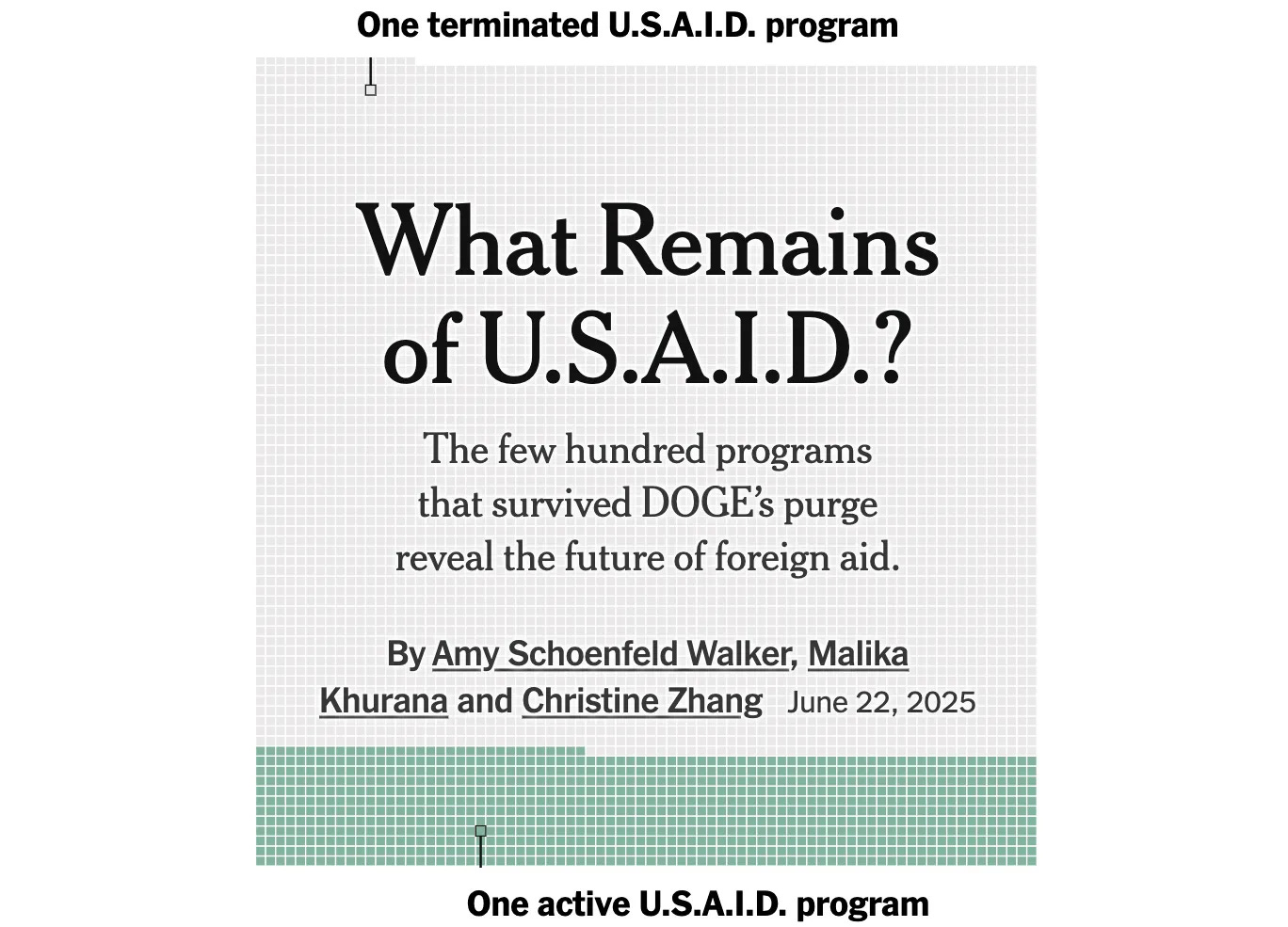🧭 Pivot with Purpose: A Pep Talk, Part Two
🍌 What monkeys can you give back this week?
“The sun was too bright, the sky was too blue, and the bananas were too sweet.
. . . In a world full of shoulds, sometimes we just need a day to feel however we need to feel.”
—Jim Panzee in the children’s book Grumpy Monkey, by Suzanne and Max Long
Catch up on part one first:
Welp, my iced tea leapt out of my hands again for the second time this week, spilling onto the floor of The Drama Book Shop’s bathroom and resulting in me crouched down futilely mopping it with reams of single-ply toilet paper. Although I could have immediately gotten a manager, I was guilty because I shouldn’t have brought an outside beverage inside in the first place. I’m really putting the tumble into tumbler, which is why I cannot be trusted with fancy things. At least this time, it was after my second keynote for Georgetown’s Pivot with Purpose series—no risk of staining my clothes, and a perfect little slapstick bookend to the two virtual keynotes this week.1
I am honored to help kick off their summer seminars, an offering backed by the Rockefeller Foundation to serve the tens of thousands of development professionals looking for work after U.S.A.I.D. was unceremoniously shuttered in February, affecting nearly 20,000 people in the U.S. and over 200,000 globally, plus the millions of aid recipients.2
After I finish a talk, even one I feel great about, my mind starts ticking off all the key talking points I missed or messed up, and there are many. In writing, I can share them a bit more articulately, so in part one, I offered a pep talk based on Pivot; today’s continues based on Free Time (currently just $0.99 on Kindle).
Dohnuts are a wise and compassionate bunch: if you feel moved to add any words of wisdom, resources, or encouragement in the comments, we will all benefit! 🙏
If Pivot is about mapping what’s next, Free Time is about understanding what’s now. Just as you got pivoted by circumstances bigger than you, now you have free time you didn’t ask for. But it doesn’t have to be limited to tiny windows where you finally get to do something fun on weekends—freeing time is a verb, a skill you can get better at.
Many of you feel like you can hardly enjoy this overwhelming expanse of free time, because it is weighed down by stress, uncertainty, and financial pressures. You don’t have the luxury of planning next moves with a steady salary funding that exploration.
In a VUCA work world—one that is volatile, uncertain, complex, and ambiguous—it can be hard to hang on to your hope, your faith, and your energy, staying oriented toward what lights you up. You have been plunged into the terroir of transformation, the unique soil where some of your most profound insights can take root about who you really are, and what you most need and want moving forward.
When you’re in the midst of a career crisis, after your surge capacity is depleted and the adrenaline fades, it’s natural to feel tired and discouraged, while still also metabolizing grief, anger, sadness, and fear. You are not broken. You are not lazy. Sometimes your body will tell you what it needs, even when inconvenient.
In an earlier Doh post, I shared the Japanese phrase, ma, combining the kanji symbols for door and sun:
“Ma is the time and space life needs to breathe, to feel, and connect. If we have no time, if our space is restricted, we cannot grow. This universal principle applies to every aspect of life.”
One small silver lining is that this moment is providing a chance for your life to breathe. If you can relax into it, just a bit, you will receive an abundance of new insights and awareness. You might even experience a rush of creativity if you let it. When things fall apart, we are highly observant—this is fertile soil for innovation.
Research from Cassie Holmes’ book, Happier Hour, shows there is a sweet spot of discretionary time. If we have too little, we are stressed; we have trouble keeping up with core responsibilities, and experience time confetti, where our time is broken up and scattered.
However, too much free time, after more than five hours each day, also has diminishing happiness returns. You feel like you’re floating. You want to know that you are learning, growing, and making an impact; you probably don’t want to sit on the couch all day eating Ben and Jerry’s—at least not for long. Those are for the down days, when you are recovering, resting, and recharging.
Rebuilding on top of an outdated time blueprint also creates stress; this rare window of time is giving you an opportunity to reexamine and rewire those inherited patterns. Most of us inherited a factory-based system, even from our parents and schooling, that benefits the owner of the company, not your human thriving. Who says you need to job search or work from nine to five (or seven to seven), five days a week? Could you accomplish one crucial task in the morning and feel good the rest of your day? Could you batch your focus and dedicate each day of the week to something different?
Give yourself permission to claim your golden hour within each day—that magical window when you are freshest, smartest, and most creative. For me, it’s six to eleven in the morning, and I protect it fiercely. No one gets that time unless it’s for a high-priority exception.
The primary diagnostic for Free Time is understanding where you are in friction, and how you can move toward flow, where work feels engaging and joyful. McKinsey research shows we are five times more productive in flow states than when we’re not.
When you’re in survival mode, creating space for flow requires you to also build the muscle of saying no to more than you otherwise would. You must give responsibilities back that aren’t yours, ones weighing you down to the point where your mind writes checks your body can’t cash. Many of you have already experienced these somatic signals, warning you that the way you are working is no longer working.
I love the Polish saying, “Not my circus, not my monkeys.” It’s a perfect tie-in to one of my favorite tiny old-school business books, The One-Minute Manager Meets the Monkey, based on one of the most popular HBR articles of all time, both building on a bit of Hollywood lore.
One day film executive Peter Guber, running a Hollywood studio at twenty-nine years old, vented to Jack Warner, president of Warner Bros. Studios, that he was overwhelmed and left with a million problems at the end of every day. Warner replied:
“Don’t be confused. You’re only renting that office. You don’t own it. You’re the zookeeper in a zoo. Every person arrives with a monkey. Think of that monkey as their problem. They’re trying to leave it with you. Sometimes you have to discover where the monkey is. It’s hidden or dressed up. But remember you’re the zookeeper. You’ve got to keep the place clean. So when you walk them to the door, be sure they’ve got their monkey by the hand. Don’t let them leave without it. And if they come back, make sure it’s trained, i.e. they have solutions to their problems. Otherwise at the end of the day, you’ll have a screaming, jumping troop of monkeys, and monkeys shit all over the place.”
How many monkeys are sitting on your desk right now? Who do they actually belong to? What monkeys can you give back this week? It’s time to give them a new owner, one that isn’t you.
Your free time is waiting for you on the other side. You have so many powerful stories inside of you, and so much hard-earned wisdom to share. Now it’s time to stop the busywork so you can do even more of your best work, and I know you are only just getting started.3
❤️
P.S. Registration is still open for over a dozen Pivot with Purpose summer sessions, and don’t forget that the Free Time book is just $0.99 on Kindle through Labor Day!
💻 Watch the recordings and check out the show notes for both sessions:
Pivot: Watch “Envisioning Your Next Chapter: Where Do You Want to Go?” (June 24) — check out the resources mentioned here »
Free Time: Watch “From Vision to Action: Staying Focused and Energized During Your Pivot” (June 26) — check out the resources mentioned here »
Sign-up for additional Pivot with Purpose summer seminar series here »
See also: The New York Times’ “What Remains of U.S.A.I.D.?”
🎧 For more context on the shutdowns, I appreciated these summary episodes:
WSJ’s The Journal: Inside USAID as Elon Musk and DOGE Ripped It Apart (Feb. 6)
Fresh Air: Inside DOGE, Post Elon Musk (June 11)
The New Yorker’s The Political Scene: The Rise and Fall of DOGE (June 18)
If you enjoyed this post, you might also appreciate:















Jenny, I bet your virtual workshop/talk was FANTASTIC! Love that G’town is doing this. I got my Exec. MBA there — it’s a great university.